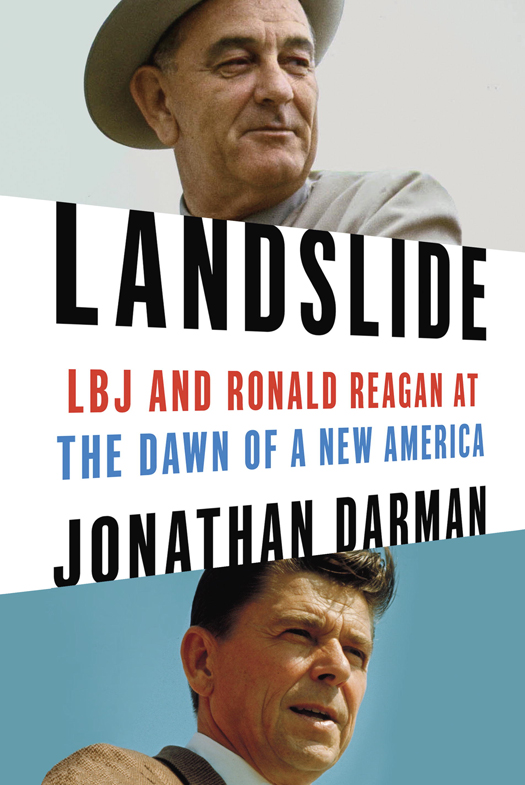
Landslide
LBJ and Ronald Reagan at the Dawn of a New America
کتاب های مرتبط
- اطلاعات
- نقد و بررسی
- دیدگاه کاربران
نقد و بررسی

September 15, 2014
Former Newsweek political reporter Darman sizes up the careers of two political powerhouses and craftsmen, Lyndon B. Johnson and Ronald Reagan, while claiming that each man's impressive litany of achievements influenced the historical arc of American leadership. In this smart and perceptive narrative, Darman discusses the contrasts between the two Americas they envisionedâmore specifically, the disparities between LBJ's liberal Great Society policies and Reagan's hardline conservative agenda. Both driven and ambitious, Johnson, the down-to-earth Texas cowboy and career politician, and Reagan, "the Errol Flynn of the B-movies" and rising Goldwater heir, zigzagged their respective ways to the White House, overcoming personal setbacks, political ambushes, and intraparty conflict along the way. On the one hand, LBJ championed the poor and civil rights, yet his hugely popular regime was leveled by the Vietnam War's economic and military burden. On the other, Reagan's amiable right-wing chatter made him the darling first of Californians and later of the entire country, yet critics panned him for his lackluster Tinseltown history. Darman's sincere and informative approach animates these historic figures, bringing them from the nostalgia of old TV clips and fading newsprint to the forefront of an engaging historical discussion. Agent: Sarah Chalfant, the Wylie Agency.

July 1, 2014
An intimate chronicle of the 1,000 days after the assassination of John F. Kennedy, during which there was a sea change in the American electorate.President Lyndon B. Johnson and Ronald Reagan both enjoyed huge election landslides, the former in his 1964 re-election bid as the standard bearer of the Great Society programs and the latter leading the conservative backlash in his defeat of Pat Brown as governor of California in 1966. In this sympathetic dual character study, former Newsweek correspondent Darman focuses on these two savvy politicians, who managed to capture the prevailing public mood and convince the voters that the best was yet to come-either for the progressive cause or the less-government-is-better platform, respectively-during a time of wrenching change in American society. Despite the prevailing shock and gloom that ensued after the assassination, LBJ, the depressed vice president largely ignored by Kennedy's administration, was galvanized by a sense of duty and legacy, becoming the "Man-in-Motion" who effected a staggering number of progressive achievements in the spirit of the dead president: civil rights legislation, poverty alleviation and education reform, Medicare and voting rights, among others. In his accomplishments during his first 100 days of office, LBJ rivaled those of FDR. Soon after, however, everything began to unravel, sowing a sense of anxiety within the country: the racial confrontation on the Selma, Alabama, Edmund Pettus Bridge; escalation of the Vietnam War; and the Watts riots. Although LBJ had crushed Barry Goldwater, the conservatives gained new impetus in Reagan's more appealingly packaged, moderate, yet still-hard-hitting anti-government speeches. The author masterfully conveys LBJ's agony, as well as former actor Reagan's free-wheeling spirit: He was the "Errol Flynn of the B movies" who had aged out of his previous roles and needed a new gig as an American hero.Ambitious, studious portraits pulled together nicely by Darman.
COPYRIGHT(2014) Kirkus Reviews, ALL RIGHTS RESERVED.

Starred review from September 15, 2014
President Lyndon Baines Johnson was riding high in 1964 when he routed Barry Goldwater in the presidential election that swept in a period of dynamic liberal legislation. Just two years later, LBJ's Great Society imploded, setting the stage for former TV and movie star Ronald Reagan and the modern conservative movement that would dominate America for the rest of the 20th century. Former Newsweek political reporter Darman's compelling, sweeping narrative explores the myths that Johnson and Reagan invented about themselves. As the author reveals, both men were driven to portray themselves as heroic "men on horseback" who would lead America to greatness, ultimately impossible roles to play. More of the book is devoted to Johnson, notably his insecurity and the depression brought about by the loss of his constituents over Vietnam and urban riots. Reagan was much more comfortable with himself and basked in the limelight of his election as governor of California in 1966 while planning for a future presidential run. VERDICT Reminiscent of such spellbinders as Rick Perlstein's Before the Storm: Barry Goldwater and the Unmaking of the American Consensus and Jeff Shesol's Mutual Contempt: Lyndon Johnson, Robert Kennedy, and the Feud That Defined a Decade, this title will engross readers of political history.--Karl Helicher, Upper Merion Twp. Lib., King of Prussia, PA
Copyright 2014 Library Journal, LLC Used with permission.

August 1, 2014
Mythmaking is integral to politics. Since history is often written by the victors, in a democracy, he or she who gets the most votes wields the biggest pen. Darman's work is concerned with political mythmaking and contrasts the narratives of Lyndon Johnson with rising upstart Ronald Reagan. Both men, in Darman's view, radically reoriented American politics and birthed, in the author's view, today's politics of unreality. The book covers the blow-by-blow account of mid-twentieth-century party politics engagingly well with the entwined stories of Johnson and Reagan. Still, the thesis seems a bit off. Haven't American politics always been part fantasy? From our founding, Americans have been told by politicians of our uniqueness, of our manifest destiny, of our je ne sais quoi. Was not America first conceived as a fabled city upon a hill ? Regardless, Darman's account has plenty of juicy tidbits that make for a rich, fly-on-the-wall narrative. If the current partisan gridlock has you pulling your hair out, this book will help you understand where these ripples originate.(Reprinted with permission of Booklist, copyright 2014, American Library Association.)

























دیدگاه کاربران